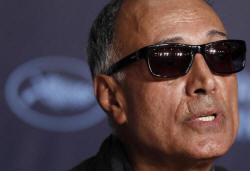|
 Kiarostami,
master of post-revolution Iranian cinema, dies at 76 Kiarostami,
master of post-revolution Iranian cinema, dies at 76
 Send a link to a friend
Send a link to a friend
[July 05, 2016]
By Babak Dehghanpisheh
BEIRUT (Reuters) - Abbas
Kiarostami, the writer-director who showed that Iranian
cinema was one of the most original and emotionally
engaging in the world, died in Paris on Monday from
complications related to cancer, according to Iranian
state media. He was 76.
|
|
 Part of a new wave of Iranian cinema that started in the
1960s and known for realist stories focused on the lives of
ordinary people, Kiarostami was one of the few film makers to
stay and prosper in Iran after the 1979 Islamic revolution. Part of a new wave of Iranian cinema that started in the
1960s and known for realist stories focused on the lives of
ordinary people, Kiarostami was one of the few film makers to
stay and prosper in Iran after the 1979 Islamic revolution.
Despite their very local, Iranian themes, his movies struck a
chord with global audiences, and Kiarostami won the Palmes d’Or
at Cannes in 1997 for "Taste of Cherry", about a middle-aged
Iranian man planning to commit suicide and looking for someone
to bury him when he is dead.
"What is peculiar about his art is that he’s both a rootedly
Iranian artist in terms of his landscape, his urban
sensibilities, his cinematography," said Hamid Dabashi, a
professor of Iranian Studies at New York's Columbia University.
"But he’s also managed to raise those Iranian aspects to moments
of universality."

American director Martin Scorsese said of his work: "Kiarostami
represents the highest level of artistry in the cinema."
Born in Tehran in 1940, Kiarostami studied at the School of Fine
Arts at Tehran University. His first foray into video was making
commercials for Iranian TV.
After the 1979 revolution that ousted Iran's monarchy and
ushered in an Islamist system of government, Kiarostami chose to
stay while many artists and writers fled the country.
[to top of second column] |

His own films, which often centered around children or poorer
Iranians living in rural areas, were never seen as overtly
political, but some of the screenplays he wrote for his protege
Jafar Panahi were.
Panahi's 2003 movie "Crimson Gold", the tragi-comic portrayal of a
pizza delivery man humiliated by his lowly social position in
Tehran, a city divided by class and money, was seen as critical of
the Islamic Republic and was banned in Iran.
Kiarostami leaves two sons, Ahmad and Bahman.
(This version of the story has been refiled to change dateline to
BEIRUT, pvs PARIS)
(Editing by Robin Pomeroy, Larry King)
[© 2016 Thomson Reuters. All rights
reserved.] Copyright 2016 Reuters. All rights reserved. This material may not be published,
broadcast, rewritten or redistributed.
 |